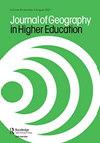Fieldwork from desktop: webdoc for teaching in the time of pandemic
IF 1
4区 教育学
Q2 EDUCATION & EDUCATIONAL RESEARCH
引用次数: 2
Abstract
ABSTRACT The article suggests an alternative teaching material to adapt to the current Covid-19 pandemic that impedes outdoor activities such as fieldwork or external visits in the university. The authors explore web documentary (hereinafter webdoc) as an option for asynchronous online teaching methods, an alternative to enable learning experiences. The result presents the students’ response to a survey with close- and open-ended questions based on their experience of two different webdocs (Montelab and Trozos Urbanos). The results demonstrate great potential for webdocs in online teaching due to game element, emotional engagement and entertainment. Students felt empowered by the interactiveness of the webdoc which led to an overall positive evaluation. Moreover, the experience was well received when it was in line with course materials with potential to communicate geographical knowledge around interdisciplinary urban challenges. Therefore, teachers should dedicate efforts for identifying appropriate webdocs to provide students with beneficial geographical learning experience that fits the course aim. On the other hand, minor negative feedback was observed based on personal interest and the general cyber fatigue from the pandemic. We suggest teachers to explore webdocs based on their needs and conclude by providing a list of recommendations and useful references.桌面实地工作:疫情期间的教学webdoc
摘要本文提出了一种替代教材,以适应当前新冠肺炎疫情,该疫情阻碍了大学的实地考察或外部访问等户外活动。作者探索了网络纪录片(以下简称webdoc)作为异步在线教学方法的一种选择,这是一种实现学习体验的替代方案。该结果根据学生对两个不同的网络文档(Montelab和Trozos Urbanos)的体验,用封闭式和开放式问题展示了他们对调查的反应。研究结果表明,由于游戏元素、情感参与和娱乐性,网络文档在在线教学中具有巨大的潜力。学生们感到网络文档的互动性赋予了他们力量,从而获得了整体的积极评价。此外,该经验与课程材料一致,有可能围绕跨学科城市挑战传播地理知识,因此广受欢迎。因此,教师应致力于确定合适的网络文档,为学生提供符合课程目标的有益地理学习体验。另一方面,基于个人兴趣和疫情带来的普遍网络疲劳,观察到了轻微的负面反馈。我们建议教师根据自己的需求探索网络文档,并提供一系列建议和有用的参考资料。
本文章由计算机程序翻译,如有差异,请以英文原文为准。
求助全文
约1分钟内获得全文
求助全文
来源期刊

Journal of Geography in Higher Education
Multiple-
CiteScore
5.80
自引率
9.50%
发文量
29
期刊介绍:
The Journal of Geography in Higher Education ( JGHE) was founded upon the conviction that the development of learning and teaching was vitally important to higher education. It is committed to promote, enhance and share geography learning and teaching in all institutions of higher education throughout the world, and provides a forum for geographers and others, regardless of their specialisms, to discuss common educational interests, to present the results of educational research, and to advocate new ideas.
 求助内容:
求助内容: 应助结果提醒方式:
应助结果提醒方式:


